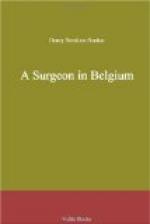There were plenty of other serious cases, some of them with ghastly injuries, and many of them must have suffered agonizing pain; but they were all doing their best to make light of their troubles, whilst their gratitude for what was done for them was extraordinary. The Belgians are by nature a cheerful race, but these were brave men, and we felt glad that we had come out to do what we could for them.
But if we give them credit for their courage and cheerfulness, we must not forget how largely they owed it to the devoted attention—yes, and to the courage and cheerfulness—of the nurses. I wonder how many of us realize what Britain owes to her nurses. We take them as a matter of course, we regard nursing as a very suitable profession for a woman to take up—if she can find nothing better to do; perhaps we may have been ill, and we were grateful for a nurse’s kindness. But how many of us realize all the long years of drudgery that have given the skill we appreciated, the devotion to her work that has made the British nurse what she is? And how many of us realize that we English-speaking nations alone in the world have such nurses? Except in small groups, they are unknown in France, Belgium, Germany, Russia, or any other country in the world. In no other land will women leave homes of ease and often of luxury to do work that no servant would touch, for wages that no servant would take—work for which there will be very little reward but the unmeasured gratitude of the very few. They stand to-day as an unanswerable proof that as nations we have risen higher in the level of civilization than any of our neighbours. To their influence on medicine and surgery I shall refer again. Here I only wish to acknowledge our debt. As a mere patient I would rather have a good nurse than a good physician, if I were so unfortunate as to have to make the choice. A surgeon is a dangerous fellow, and must be treated with respect. But as a rule the physician gives his blessing, the surgeon does his operation, but it is the nurse who does the work.




